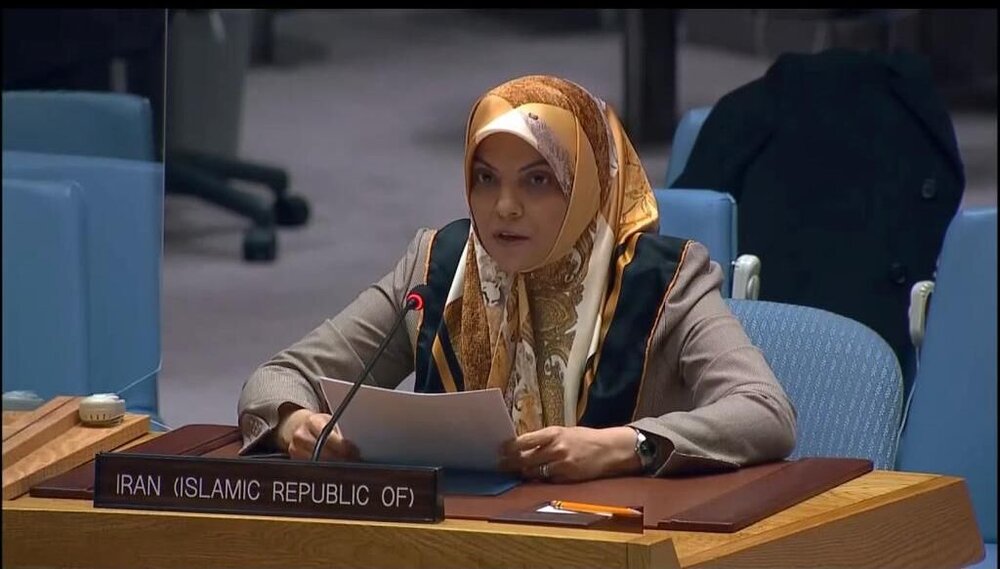‘Achievements in empowering women are undeniably remarkable despite sanctions’

TEHRAN – Zahra Ershadi, Iran's ambassador and deputy representative to the United Nations, has said that Iran has made significant progress in empowering women, despite U.S. illegal and inhumane sanctions.
She made the remarks at a meeting of the Security Council on women, peace, and security held on Tuesday.
“The United States-imposed illegal and inhumane sanctions against the country have negatively affected the financing and executing of the programs planned by the Government, civil society, and private sectors aiming at women advancement and empowerment. However, Iran has made significant achievements in this regard.
Women have an undeniable role to play in promoting dialogue and confidence in the peace and security process. It is a well-known fact that encouraging women to participate in the peace process increases the possibility of peace.
As a result, women's participation in the peace process increases the effectiveness of humanitarian aid, enhances civilian protection, contributes to the political settlement of disputes and the maintenance of long-term peace, and accelerates economic reconstruction,” she highlighted.
Referring to the situation of women in the region, she stated that “the Palestinian women and girls continue to suffer because of the decades-long occupation and human rights violations, as well as the Israeli regime’s colonial and apartheid policies and practices in the Occupied Palestinian Territory.
In Afghanistan, the current situation has severely affected Afghan women’s rights, including their political and socio-economic rights, such as the right to education, work, and political participation. The Taliban should heed the international community’s call to protect human rights, particularly women’s rights.
Issues concerning women and girls are the responsibility of the General Assembly. The Security Council should only address this issue if it is directly related to the maintenance of international peace and security.”
On February 15 Ershadi slammed U.S. sanctions against the Iranian nation, saying "these illegal actions have directly impacted the lives of Iran's most vulnerable citizens, including women, children, and patients."
"What is further distressing is the reality that many children have lost their lives as a result," she said, IRNA reported.
"As our President stated in his address to the UNGA session, imposing unilateral sanctions against the Iranian people, particularly sanctions on medicine and humanitarian items, are criminal acts on par with crimes committed against humanity. Those who sanction countries should not go unpunished for such heinous crimes," Ershadi said addressing the United Nations Commission for Social Development.
Iran has repeatedly denounced the sanctions as an act of “economic war”, “economic terrorism”, and “medical terrorism”.
"Under the current circumstances, the Government of Iran has provided special financial packages as well as social and economic rehabilitation plans for poor and people in the vulnerable situation along with economic support measures, especially for small businesses," the Iranian diplomat said.
"In the meantime, treatment programs have been provided for around 4 million legal and illegal Afghan refugees," she concluded.
Claudio Providas, UNDP Representative in Iran, has said Iran was among the first countries to be hard hit by COVID-19.
In an article published by the Tehran Times on Monday, he wrote that the pandemic broke out at a time when the nation was still reeling under the impact of the unilateral economic sanctions, and this added to the pressures on daily life, particularly on women.
“The participation of Iranian women in the economy post-pandemic declined. The effect of this reduction was worse among Women's Head Households (WHH) - and in low-income households headed by women, the situation was even more complicated.
According to the Statistical Center of Iran, out of twenty-two (22) million families in Iran, over three (3) million are WHH and most of them are in less-developed areas. The Government prioritized such families for targeting socio-economic support.”
FB/MG

Leave a Comment